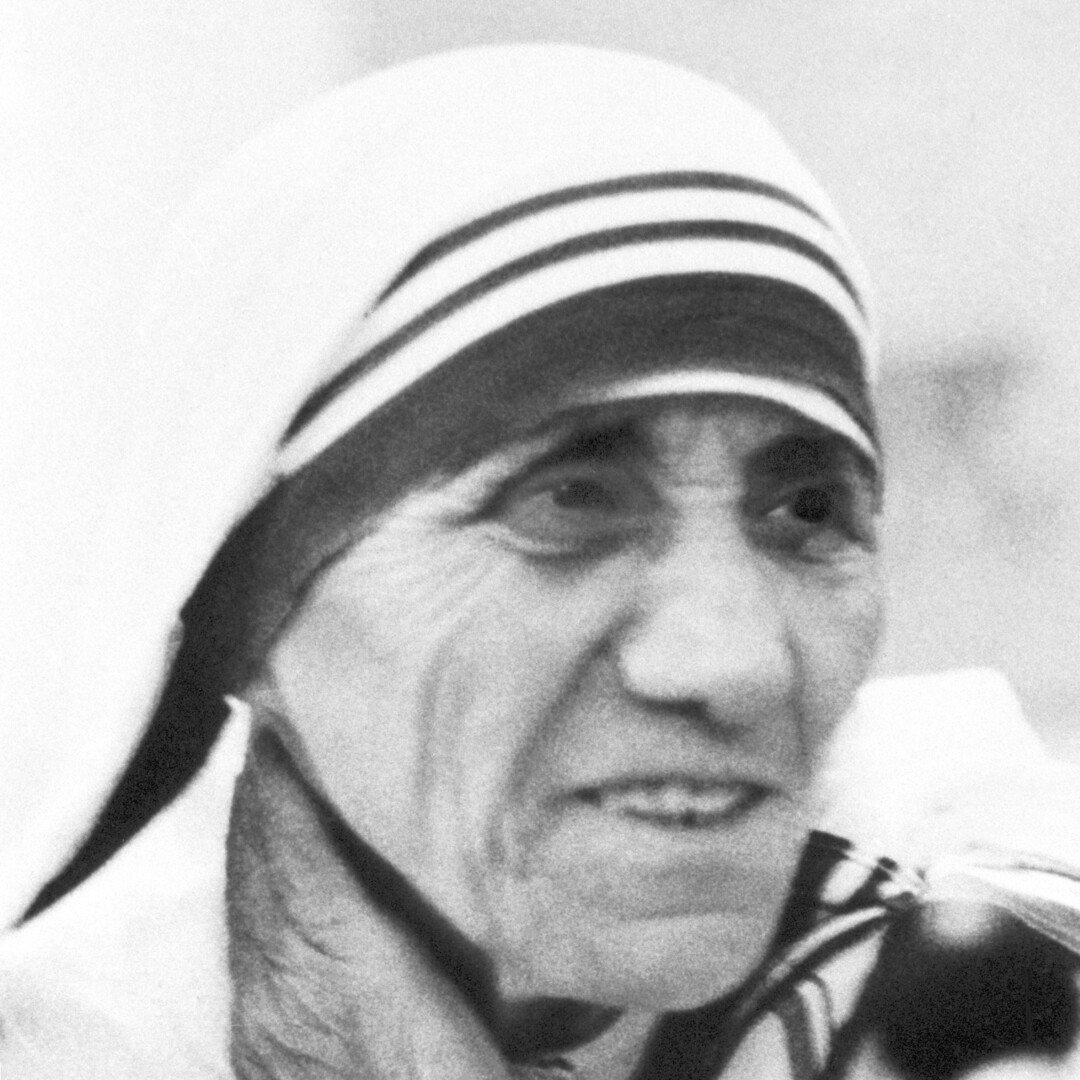Mother Teresa
Speed read
Mother Teresa was awarded the Nobel Peace Prize for her efforts to bring help to suffering humanity.

Full name: Mother Teresa
Born: 26 August 1910, Uskup, Ottoman Empire (now Skopje, North Macedonia)
Died: 5 September 1997, Calcutta, India
Date awarded: 27 October 1979
Dedicating her life to the poor
At the age of twelve, Agnes Gonxha Bojaxiu, a Catholic girl in Albania, received a call to dedicate her life to God. She joined an order of nuns, received an education and was sent to Calcutta, India to teach. Her new name was Teresa. In India she received a new call from God: she was to help the poor while living among them. She founded a new order, the “Missionaries of Charity,” which built orphanages, leprosy centres and hostels for the terminally ill in Calcutta. Mother Teresa’s organisation also ministered to the needy in other parts of the world. The modest nun in the white sari with blue edging and a silver cross on her left shoulder became a familiar figure throughout the world. She met with many heads of state, and donations poured in to the “Missionaries of Charity.”
"You have been the Mother of Bengal, now you are the Mother of the World."
Jyoti Basu, Indian politician,1979.
From the voice of God
While riding on a train in 1946, Mother Teresa received her second call. As she later explained, she was certain that she heard the voice of God calling to her. “The message was clear. I was to leave the convent and help the poor, while living among them.” This was a call that had to be obeyed, a call within her vocation. The following year the Vatican gave its consent. After an intensive course in nursing training, she began her work in the slums of Calcutta. A handful of students from the school where she had taught volunteered to help her. She distributed food to the poor and opened a primitive hospital.
The Missionaries of Charity
In 1950 Mother Teresa founded the order “Missionaries of Charity.” Placed directly under the jurisdiction of the Vatican, this order experienced phenomenal growth. When Mother Teresa received the Nobel Peace Prize in 1979, the order numbered 1100 nuns and 300 novices. In India the nuns ran 30 orphanages, 70 leprosy centres and a number of hospices for the terminally ill. Mother Teresa also cared about those who were suffering in other parts of the world. She was a marvellous fundraiser, organising relief work in Africa, the Middle East, South America and the USA.
"The poor are great! The poor are wonderful! The poor are very generous! They give us much more than we give them."
Mother Teresa in 'In my own words', 1997.
A pointed message
Mother Teresa’s Nobel Prize lecture gave her an opportunity to talk about matters close to her heart. She viewed Christ’s teachings about loving one’s neighbours as fundamental. People who say they love God, but who do not love their fellow man, are liars, she said. She vehemently attacked abortion: “Abortion is a direct war, a direct killing – direct murder by the mother herself.” Nor was birth control acceptable. Instead, the “Missionaries of Charity” chose to teach the poor what Mother Teresa called “natural” family planning: abstinence and safe periods.
Learn more
Mother Teresa was born Agnes Gonxha Bojaxhiu in Uskup, Ottoman Empire (now Skopje, North Macedonia), on August 26, 1910. Her family was of Albanian descent. At the age of twelve, she felt strongly the call of God ...
Disclaimer: Every effort has been made by the publisher to credit organisations and individuals with regard to the supply of photographs. Please notify the publishers regarding corrections.
Nobel Prizes and laureates
Six prizes were awarded for achievements that have conferred the greatest benefit to humankind. The 12 laureates' work and discoveries range from proteins' structures and machine learning to fighting for a world free of nuclear weapons.
See them all presented here.
